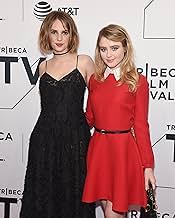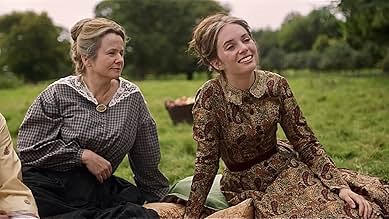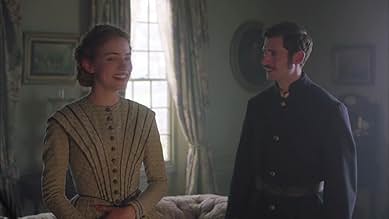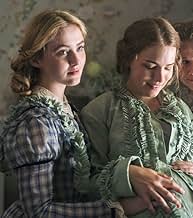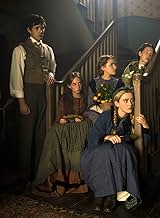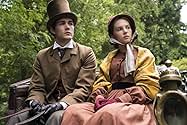NOTE IMDb
7,2/10
5,2 k
MA NOTE
Dramatisation du roman de Louisa May Alcott sur la vie des quatre sœurs March pendant la guerre civile américaine alors qu'elles apprennent à gérer l'amour, la perte et les épreuves de la cr... Tout lireDramatisation du roman de Louisa May Alcott sur la vie des quatre sœurs March pendant la guerre civile américaine alors qu'elles apprennent à gérer l'amour, la perte et les épreuves de la croissance.Dramatisation du roman de Louisa May Alcott sur la vie des quatre sœurs March pendant la guerre civile américaine alors qu'elles apprennent à gérer l'amour, la perte et les épreuves de la croissance.
- Récompenses
- 3 victoires et 7 nominations au total
Parcourir les épisodes
Avis à la une
Little Women (TV Mini-Series 2017) was a BBC/Masterpiece Theater production directed by Vanessa Caswill. This novel lends itself to the world of cinema, and many good versions are available. However, I liked this one best.
Maya Hawke does very well as Jo, which couldn't have been easy, because she's very beautiful and Jo is supposed to be the plain one. Kathryn Newton plays Amy March, who is beautiful but "willful." Willa Fitzgerald portrays Meg March, the most beautiful and most conventional sister. Annes Elwy plays Beth, who is extremely shy. Elwy is Welsh, and speaks Welsh, but I didn't hear any accent when she played the role.
Angela Lansbury plays Aunt March perfectly. Believe it or not, I thought she was even better than Maggie Smith(!).
Mark Stanley plays Professor Bhaer, which is a difficult role. Directors have protrayed Professor Bhaer as old and stodgy, in which case you wonder what Jo had in mind. Other directors have made the character young and handsome, and so Jo's choice is a no-brainer. I think director Caswill got this casting exactly right. Somewhat older, but not stodgy, and just handsome enough to attract a young woman like Jo.
My favorite actor in the movie was Emily Watson who played Marmee. She is a highly experienced English actor. (Again, no trace of an accent.) She looks like the character she portrays--saddened and toughened by a life of genteel poverty. Raising four very different daughters on her own could not have been easy, but Watson allows us to believe she could do it. Just her work alone would be enough to make me recommend the movie.
This version of Little Women was made for TV as a three-part miniseries. Three hours of screen time gave director Caswill the opportunity to address most of the many plot lines in the novel. We saw the movie on DVD, and we could have watched it as a single long movie. However, we watched it in three one-hour episodes, as intended by the producers. Either way will work.
Little Women has a pretty good IMDb rating of 7.2. I thought that it was much better than that, and rated it 9.
Maya Hawke does very well as Jo, which couldn't have been easy, because she's very beautiful and Jo is supposed to be the plain one. Kathryn Newton plays Amy March, who is beautiful but "willful." Willa Fitzgerald portrays Meg March, the most beautiful and most conventional sister. Annes Elwy plays Beth, who is extremely shy. Elwy is Welsh, and speaks Welsh, but I didn't hear any accent when she played the role.
Angela Lansbury plays Aunt March perfectly. Believe it or not, I thought she was even better than Maggie Smith(!).
Mark Stanley plays Professor Bhaer, which is a difficult role. Directors have protrayed Professor Bhaer as old and stodgy, in which case you wonder what Jo had in mind. Other directors have made the character young and handsome, and so Jo's choice is a no-brainer. I think director Caswill got this casting exactly right. Somewhat older, but not stodgy, and just handsome enough to attract a young woman like Jo.
My favorite actor in the movie was Emily Watson who played Marmee. She is a highly experienced English actor. (Again, no trace of an accent.) She looks like the character she portrays--saddened and toughened by a life of genteel poverty. Raising four very different daughters on her own could not have been easy, but Watson allows us to believe she could do it. Just her work alone would be enough to make me recommend the movie.
This version of Little Women was made for TV as a three-part miniseries. Three hours of screen time gave director Caswill the opportunity to address most of the many plot lines in the novel. We saw the movie on DVD, and we could have watched it as a single long movie. However, we watched it in three one-hour episodes, as intended by the producers. Either way will work.
Little Women has a pretty good IMDb rating of 7.2. I thought that it was much better than that, and rated it 9.
Unlike many classic adaptations the BBC has released in the past, problem after problem weighs down Little Women and stops the series from being a truly enjoyable watch.
The book itself is largely written in a sweet, innocent voice/tone, and it works well within the text. However, when translating or trying to capture that same voice or spirit in actual dialogue for the screen, it comes off as amateurish or overly sentimental when spoken aloud. The text's tone is actually one of the reasons why this book is difficult to adapt. It is not the acting that lets the series down, rather it is the words that are unbelievable. People simply don't/didn't speak in such a way, even in the Victorian period. If this version is trying to modernize the girl's characters/eccentricities and the story's main message, why could it not modernize the language a bit or be a little more age appropriate- of course, still keeping it in line with the book's tone. An adaptation of Little Women should strike a balance between the two parts of the girls' and Laurie's journey into adulthood. First, establishing the way things are and have always been in the March home in a playful tone, and then, as they are forced to change through the circumstances of life and love, the tone becomes more heartwarming and more mature. From the get-go, this version applies a serious and mature tone despite the language used and the children's level of maturity, so, there is never a real transformation in character/perspective for any of the children, only in the circumstances they find themselves in.
Another glaring problem is the editing and structuring of the plot. Simply put, many scenes are too short; the scenes are like snapshots; they tell the basic story from a surface, visual level, but it lacks any depth, detail, or real explanation. This version misses the opportunity, being that it is longer and has more time, to include parts that have been left out of adaptations before it- parts that develop or establish the characters, their relationships, and their motives (examples, Jo visiting Laurie when ill, meeting Mr. Lawrence, Laurie's backstory and mother, the girls engaging in Jo's plays, Laurie joining in). Actually, this version excludes more than it adds, which is a little baffling. How can so much be glossed over?
The last problem is the accompanying score. If I am not mistaken, the music used within the series seems to be lifted from or inspired by the Radio 4 play of Little Women. Which is an odd choice, being that it is not of the period. Adding a modern score can work, but here, it is a miss-match.
Though the 94 film has its faults as well, it remains the best crack at adapting Alcott's work, which is disappointing seeing that the BBC had so much potential.
The book itself is largely written in a sweet, innocent voice/tone, and it works well within the text. However, when translating or trying to capture that same voice or spirit in actual dialogue for the screen, it comes off as amateurish or overly sentimental when spoken aloud. The text's tone is actually one of the reasons why this book is difficult to adapt. It is not the acting that lets the series down, rather it is the words that are unbelievable. People simply don't/didn't speak in such a way, even in the Victorian period. If this version is trying to modernize the girl's characters/eccentricities and the story's main message, why could it not modernize the language a bit or be a little more age appropriate- of course, still keeping it in line with the book's tone. An adaptation of Little Women should strike a balance between the two parts of the girls' and Laurie's journey into adulthood. First, establishing the way things are and have always been in the March home in a playful tone, and then, as they are forced to change through the circumstances of life and love, the tone becomes more heartwarming and more mature. From the get-go, this version applies a serious and mature tone despite the language used and the children's level of maturity, so, there is never a real transformation in character/perspective for any of the children, only in the circumstances they find themselves in.
Another glaring problem is the editing and structuring of the plot. Simply put, many scenes are too short; the scenes are like snapshots; they tell the basic story from a surface, visual level, but it lacks any depth, detail, or real explanation. This version misses the opportunity, being that it is longer and has more time, to include parts that have been left out of adaptations before it- parts that develop or establish the characters, their relationships, and their motives (examples, Jo visiting Laurie when ill, meeting Mr. Lawrence, Laurie's backstory and mother, the girls engaging in Jo's plays, Laurie joining in). Actually, this version excludes more than it adds, which is a little baffling. How can so much be glossed over?
The last problem is the accompanying score. If I am not mistaken, the music used within the series seems to be lifted from or inspired by the Radio 4 play of Little Women. Which is an odd choice, being that it is not of the period. Adding a modern score can work, but here, it is a miss-match.
Though the 94 film has its faults as well, it remains the best crack at adapting Alcott's work, which is disappointing seeing that the BBC had so much potential.
I have read Little Women so many times that I have lost count and was looking forward to seeing this rendition. What a disappointment. As others have mentioned the acting is mediocre at best and the script seems trite. I only watched about half of it and then tuned out.
If you're a fan of the book, you'll enjoy this series. I've read the book several times, and was glad I chose this version of Little Women to watch over my holiday break.
If you haven't read the book you may feel the acting is a little flat or the speech odd in places. But I've found that movies and mini series that stay true to the older books they were written often after aren't as dramatic what we're accustomed to. They didn't try to modernize the show. It remains the same wholesome story about the March family's struggles living in the US during the mid-to-late 1800's.
The March family is middle class. Enough money to have food on the table, a comfortable home, and one servant. But not enough to buy much that is new or to afford travel as their wealthier neighbors do. They are concerned about those around them who are less fortunate, and sacrifice of themselves to care for others. The daughters' personalities vary - with a tomboy, a "princess", and two girls whose personalities fall in between. There is war, death, love, friendship... Basically it's just about real life, and well worth watching in my opinion.
If you haven't read the book you may feel the acting is a little flat or the speech odd in places. But I've found that movies and mini series that stay true to the older books they were written often after aren't as dramatic what we're accustomed to. They didn't try to modernize the show. It remains the same wholesome story about the March family's struggles living in the US during the mid-to-late 1800's.
The March family is middle class. Enough money to have food on the table, a comfortable home, and one servant. But not enough to buy much that is new or to afford travel as their wealthier neighbors do. They are concerned about those around them who are less fortunate, and sacrifice of themselves to care for others. The daughters' personalities vary - with a tomboy, a "princess", and two girls whose personalities fall in between. There is war, death, love, friendship... Basically it's just about real life, and well worth watching in my opinion.
Le saviez-vous
- AnecdotesDirector Vanessa Caswill expanded on the idea that historical accuracy and period authenticity was paramount. "We asked them to grow their underarm hair, because that would have been authentic, and not to have visible make-up because they wouldn't have worn any," she says. (Little Women Production Notes)
- GaffesIf Jo is old enough to attend an evening party, she would not be wearing her hair in a long braid, but up in the severe, center-parted styles of the period. Being old enough to put one's hair up and go to parties was an important rite of passage into adulthood, and even someone as unconventional as Jo would not have attended a social function with her hair down.
- ConnexionsFeatured in The South Bank Show: Heidi Thomas (2019)
Meilleurs choix
Connectez-vous pour évaluer et suivre la liste de favoris afin de recevoir des recommandations personnalisées
- How many seasons does Little Women have?Alimenté par Alexa
Détails
- Date de sortie
- Pays d’origine
- Langue
- Aussi connu sous le nom de
- Little Women
- Lieux de tournage
- Sociétés de production
- Voir plus de crédits d'entreprise sur IMDbPro
Contribuer à cette page
Suggérer une modification ou ajouter du contenu manquant

Lacune principale
What is the Hindi language plot outline for Les quatre filles du docteur March (2017)?
Répondre


